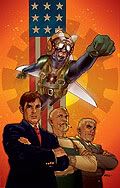Making A Sick Hearse Out Of A Slow Fear
There’s an episode of The Simpsons in which Bart is invited to have dinner with the Reverend and Mrs. Lovejoy.
He looks for a way to contribute to the dinner conversation and finally hits on the idea of telling those assembled about the plot of an episode of Martin he’d seen recently. We can tell before he gets to the end of his first sentence that it’s going to end badly.
The next shot is Bart being hustled to the front door, trying to explain but only managing to get out “But…but…but…” The sensitive Mrs. Lovejoy (“Won’t somebody think of the children?”) misunderstands the word as “butt” and, with hands over her ears, cries out “Make him stop!”
There was a little of that going on as I read my speech at the birthday party. I thought I was being charming, but all that anyone heard was butt butt butt.
Now in the interest of full disclosure, I should say that I understood that I was taking a slight risk, if only because it wasn’t exactly the sort of thing people usually heard from me. But that was what I had hoped might also contribute to the hilarity, this sense of the unexpected. Or maybe I had just watched Borat too many times.
And it’s not that I’m such a fan of rude humor, although it depends on how it’s done. The rudest humor I can think of is that on Peter Cook and Dudley Moore’s Derek and Clive albums, but that is so completely over the top so intentionally that I laugh every time.
Once in a while, though, one occasionally feels the need to not so much offend as transgress. Break a rule, cross a line, push an envelope, see what happens.
Now if I had thought what I had done wouldn’t be funny, I wouldn’t have done it because the success of the speech was the number one goal. But in my head (a dangerous barometer to go by, admittedly) this thing was funny. Looking it over after the fact, I still think that with the opportunity to perform it in a quieter space, with time to let the lines breathe, it would work.
I could tell as soon as I got to the first joke, however, that I was in big trouble.
What is the sound of no hands clapping?
The deadliest of silences had settled on the proceedings and I was afraid to look up from the page, sensing that this would only create further embarrassment. This was the bellweather joke – if this didn’t work, the rest was going to be pure torture for everyone, especially me.
My eyes flew down the page, desperately searching for the jokes that would save me. All I could find was more of the same, wisecracks about genitalia and decrepitude. What had I been thinking?
Johnny Carson used to have this great shtick he did when he was bombing. Taking the full measure of the audience’s apathy, he’d nod to the orchestra and start to tap dance as they played Tea For Two, as if to say “I’ll entertain you if it kills me.” Inevitably, this would get more laughs than the actual joke would have.
I had no such back up plan and felt pushed into taking Winston Churchill’s famous advice, “If you’re going through hell, keep going.”
My speech had suddenly become a death march, an endless corridor of quiet that threatened to sabotage the entire affair. Time slowed to a crawl as I delivered each line into an infinite darkness, knowing that there was no chance of rescue or escape. I could feel a chorus of uncomprehending eyes staring at me, sick with sadness and confusion.
My god, how long was this thing?
Finally, mercifully, as I got close to the end, part of this ill-conceived venture actually worked:
And that’s the wonderful thing about being alive now, they keep finding new and better ways of extending our suffering, which is great. It means years more of drooling on yourself and mumbling incoherently to 19 year old orderlies who will feel like they’d rather die than resemble the grotesque parody of humanity that you’ve become. My point is that we’re all going to get there together, one large incontinent mass of foul and flatulent flesh, shuffling our way into the grave as civilization makes haste to erase any evidence that we existed.
Anyway, happy 50th, honey.
The crowd threw me a bone and chuckled at that, but I had not been forgiven for what had preceded it, I could tell. That little bit of laughter felt like I’d discovered an oasis after years spent wandering in the desert.
I’d learned a valuable lesson, though. You can never take your audience for granted and have to earn their reaction every time as if it were the first. You have to tailor what you do to invite the largest number of people into the tent with you and know when to get off the stage.
Or, as I might have said that night, width is far more important than length.
He looks for a way to contribute to the dinner conversation and finally hits on the idea of telling those assembled about the plot of an episode of Martin he’d seen recently. We can tell before he gets to the end of his first sentence that it’s going to end badly.
The next shot is Bart being hustled to the front door, trying to explain but only managing to get out “But…but…but…” The sensitive Mrs. Lovejoy (“Won’t somebody think of the children?”) misunderstands the word as “butt” and, with hands over her ears, cries out “Make him stop!”
There was a little of that going on as I read my speech at the birthday party. I thought I was being charming, but all that anyone heard was butt butt butt.
Now in the interest of full disclosure, I should say that I understood that I was taking a slight risk, if only because it wasn’t exactly the sort of thing people usually heard from me. But that was what I had hoped might also contribute to the hilarity, this sense of the unexpected. Or maybe I had just watched Borat too many times.
And it’s not that I’m such a fan of rude humor, although it depends on how it’s done. The rudest humor I can think of is that on Peter Cook and Dudley Moore’s Derek and Clive albums, but that is so completely over the top so intentionally that I laugh every time.
Once in a while, though, one occasionally feels the need to not so much offend as transgress. Break a rule, cross a line, push an envelope, see what happens.
Now if I had thought what I had done wouldn’t be funny, I wouldn’t have done it because the success of the speech was the number one goal. But in my head (a dangerous barometer to go by, admittedly) this thing was funny. Looking it over after the fact, I still think that with the opportunity to perform it in a quieter space, with time to let the lines breathe, it would work.
I could tell as soon as I got to the first joke, however, that I was in big trouble.
What is the sound of no hands clapping?
The deadliest of silences had settled on the proceedings and I was afraid to look up from the page, sensing that this would only create further embarrassment. This was the bellweather joke – if this didn’t work, the rest was going to be pure torture for everyone, especially me.
My eyes flew down the page, desperately searching for the jokes that would save me. All I could find was more of the same, wisecracks about genitalia and decrepitude. What had I been thinking?
Johnny Carson used to have this great shtick he did when he was bombing. Taking the full measure of the audience’s apathy, he’d nod to the orchestra and start to tap dance as they played Tea For Two, as if to say “I’ll entertain you if it kills me.” Inevitably, this would get more laughs than the actual joke would have.
I had no such back up plan and felt pushed into taking Winston Churchill’s famous advice, “If you’re going through hell, keep going.”
My speech had suddenly become a death march, an endless corridor of quiet that threatened to sabotage the entire affair. Time slowed to a crawl as I delivered each line into an infinite darkness, knowing that there was no chance of rescue or escape. I could feel a chorus of uncomprehending eyes staring at me, sick with sadness and confusion.
My god, how long was this thing?
Finally, mercifully, as I got close to the end, part of this ill-conceived venture actually worked:
And that’s the wonderful thing about being alive now, they keep finding new and better ways of extending our suffering, which is great. It means years more of drooling on yourself and mumbling incoherently to 19 year old orderlies who will feel like they’d rather die than resemble the grotesque parody of humanity that you’ve become. My point is that we’re all going to get there together, one large incontinent mass of foul and flatulent flesh, shuffling our way into the grave as civilization makes haste to erase any evidence that we existed.
Anyway, happy 50th, honey.
The crowd threw me a bone and chuckled at that, but I had not been forgiven for what had preceded it, I could tell. That little bit of laughter felt like I’d discovered an oasis after years spent wandering in the desert.
I’d learned a valuable lesson, though. You can never take your audience for granted and have to earn their reaction every time as if it were the first. You have to tailor what you do to invite the largest number of people into the tent with you and know when to get off the stage.
Or, as I might have said that night, width is far more important than length.
















